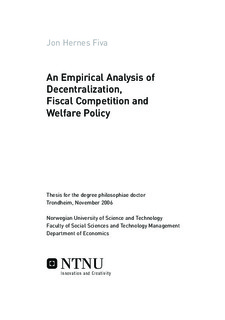| dc.contributor.author | Fiva, Jon H | nb_NO |
| dc.date.accessioned | 2014-12-19T14:32:03Z | |
| dc.date.available | 2014-12-19T14:32:03Z | |
| dc.date.created | 2006-11-01 | nb_NO |
| dc.date.issued | 2006 | nb_NO |
| dc.identifier | 126211 | nb_NO |
| dc.identifier.isbn | 82-471-8007-3 | nb_NO |
| dc.identifier.uri | http://hdl.handle.net/11250/267207 | |
| dc.description.abstract | While competition among companies tends to be beneficial for the general public, this is not necessarily the case for competition among governments. Key in the fiscal competition theory is that the mobility of firms and households yields incentives for governments to aim to improve their relative position through successive undercutting of tax rates and welfare state arrangements. This mechanism has the potential to work as a disciplining device because it ensures that no jurisdiction is allowed to be grossly inefficient, because if it were grossly inefficient, mobile factors of production would move away. The main concern in the theoretical fiscal competition literature, however, has been that fiscal competition lowers government spending below their efficient levels. Another concern related to fiscal competition is that household mobility is likely to undermine attempts by governments to redistribute income. Empirical evaluation of both the existence and consequences of fiscal competition is the central topic of the thesis “An Empirical Analysis of Decentralization, Fiscal Competition and Welfare Policy”.
A particular focus of this thesis is on fiscal competition in welfare policy. With decentralized responsibility for the welfare benefit system in Norway, theory predicts that local governments will behave strategically in setting their welfare policy in order to avoid becoming ‘welfare magnets’. The key finding in Chapter 2 of this thesis is that Norwegian local governments in fact engage in such a ‘welfare game’. A local government will respond with reducing their welfare benefits when neighboring local governments reduce their welfare benefits. Encouraged by the finding in Chapter 2, Chapter 3 seeks to answer the question: Does Welfare Policy Affect Residential Choices? The analysis shows that Norwegian welfare recipients respond to changes in welfare policy by migrating. Local politicians concern about being to generous compared to their peers seem warranted. The analysis in Chapter 4 evaluates whether strategic interaction among Norwegian local governments in property tax decisions occurs. With limited mobility of the tax base and politically highly visible decisions, we interpret the strategic interaction found to be driven by yardstick competition, rather than competition for a mobile tax base. The final chapter differs from the rest in that it utilizes data from 18 OECD countries. The essay analyzes the effects of decentralization of government on the size and composition of government spending. Since jurisdictions with limited geographic scope (such as local governments) are, in general, more likely to face greater competitive pressures than larger ones (such as countries), it follows that the more fiscally decentralized countries are expected to experience stronger fiscal competition. One of the key findings is that decentralization of taxing powers is associated with less transfer spending, but unrelated to government consumption. | nb_NO |
| dc.language | eng | nb_NO |
| dc.publisher | Fakultet for samfunnsvitenskap og teknologiledelse | nb_NO |
| dc.relation.ispartofseries | Doktoravhandlinger ved NTNU, 1503-8181; 2006:124 | nb_NO |
| dc.relation.haspart | Fiva, Jon H; Rattsø, Jørn. Welfare competition in Norway. European Journal of Political Economy. 22: 202-222, 2006. | nb_NO |
| dc.relation.haspart | Fiva, Jon H. Does Welfare Policy Affect Residential Choices?. . | nb_NO |
| dc.relation.haspart | Fiva, Jon H; Rattsø, Jørn. Local Choice of Property Taxation. . | nb_NO |
| dc.relation.haspart | Fiva, Jon H. New Evidence on the Effect of Fiscal Decentralization on the Size and Composition of Government Spending. FinanzArchiv / Public Finance Analysis. 62(2): 250-280, 2006. | nb_NO |
| dc.subject | Strategic interaction among governments | en_GB |
| dc.subject | fiscal competition | en_GB |
| dc.subject | welfare migration | en_GB |
| dc.subject | spatial econometrics | en_GB |
| dc.subject | fiscal decentralization | en_GB |
| dc.subject | size of government | en_GB |
| dc.title | An Empirical Analysis of Decentralization, Fiscal Competition and Welfare Policy | nb_NO |
| dc.type | Doctoral thesis | nb_NO |
| dc.contributor.department | Norges teknisk-naturvitenskapelige universitet, Fakultet for samfunnsvitenskap og teknologiledelse, Institutt for samfunnsøkonomi | nb_NO |
| dc.description.degree | PhD i samfunnsøkonomi | nb_NO |
| dc.description.degree | PhD in Economics | en_GB |
